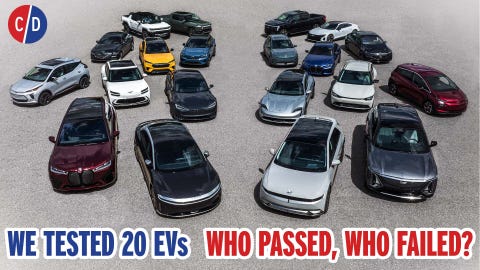- The Inflation Control Act, when enacted last fall, made major changes to how the federal government encourages the purchase of electric vehicles, prioritizing monetary limits and domestic production and procurement to exclude overall sales from consideration. Did.
- However, the IRS has not yet disclosed how it will calculate the procurement requirements. This means we are entering a strange time for EV buying where some of the old rules are gone, but not all of the new rules have come into effect. .
- GM has already cut prices by about $6,000 in 2023, so sales of the Chevrolet Volt EV and EUV are expected to continue for several months. Electric hatchbacks are also, somewhat surprisingly, eligible for a $7,500 tax credit. at least March.
For those of us who have been covering electric vehicles for the past few months, it's been at least a little frustrating. The automaker's representatives have not clarified whether their EVs qualify for tax credits under the changes introduced in the Inflation Reduction Act (IRA). Turns out it wasn't their fault. The federal government hasn't made the rules 100% clear, and EV shoppers could take advantage of that chaos in the coming months.
Although the IRA published explanations of how it changed EV tax incentives, they were inevitably vague on some details. The reason is that we don't actually publish the part until March, and that delay opens up a loophole on January 1st.
To set the stage, recall that the IRA changed its EV rule from a simple global limit of 200,000 eligible vehicles per manufacturer. Currently, there are MSRP and income level limits for EV buyers to qualify for tax credits, and vehicles use battery components sourced from countries that the US provides for free, without going into details. It must be manufactured in the USA. -Trade agreements. The maximum credit value is $7500, but if the battery minerals are not supplied correctly, the maximum credit value is half that, or $3750. However, some of the statutory language is not specific, which means that the appropriate federal agency must explain what it means, especially when it comes to procurement.
oh good government explanation
The Treasury Department and the Internal Revenue Service (IRS) released three small clarifications this week. The first is an up-to-date list of which vehicles fall into which credit level. Second, the IRS has clarified the incremental costs of commercial clean vehicles next year. This will allow tax credits to be claimed for EVs under “commercial” use, including leasing and ridesharing, regardless of where the vehicle was manufactured. Third, the new MSRP limit was explained, with the IRS saying that the "in service" date listed on the tax credit is the date you own the new EV, not the date you purchase it. Check out our new FAQ page. Somewhere there you may find the answer to your question.
there is a loophole here
This leads to loopholes. No clarifications have been released on the IRA's procurement rules, and the IRS said he won't publish this proposed guidance until March. The delay creates a window on some vehicles such as the Chevrolet Volt EV and his EUV, as well as Teslas priced under his $55,000. GM and Tesla have each sold more than 200,000 EVs, so these EVs won't qualify for the federal tax credit at the end of 2022, but they're trying to qualify again. The 200,000 sales rule will be abolished starting January 1, and new rules on MSRP, income limits, and procurement will take effect.
Electric vehicles that meet other requirements will be eligible for the full $7,500 credit starting January 1, as the IRS has not clarified what the procurement rules are. For Tesla, the maximum price for Model 3 and 5-seater models is $55,000. Y, the 7-seat Model Y EV is priced at $80,000. All Bolt variants are eligible for the full $7500. GM also slashed the price of his 2023 Bolt by about $6000 compared to his 2022's, so the new model Bolt will be an especially hot deal as long as you can get delivery. Purchase new EVs before the new procurement rules take effect.
“The information released today is an important step in clarifying the new requirements for consumers, businesses, and state and local governments planning to purchase electric vehicles,” said Adoption of Plug-in Vehicles. “Proposed guidance on procurement provisions was not released today, but a white paper was released on possible directions taken by the Treasury Department. , and help clarify when the new requirements will come into effect."Even today, the IRS is unable to provide a complete picture of the EV tax credit. The agency is currently providing an up-to-date list of which vehicles qualify, but it's not complete and says, "It will be updated over the next few days and weeks, so we're looking to buy a new clean vehicle for the new year." should be checked regularly.” No kidding.
This content is imported from OpenWeb. You may be able to find the same content in a different format or find more information on the website.
